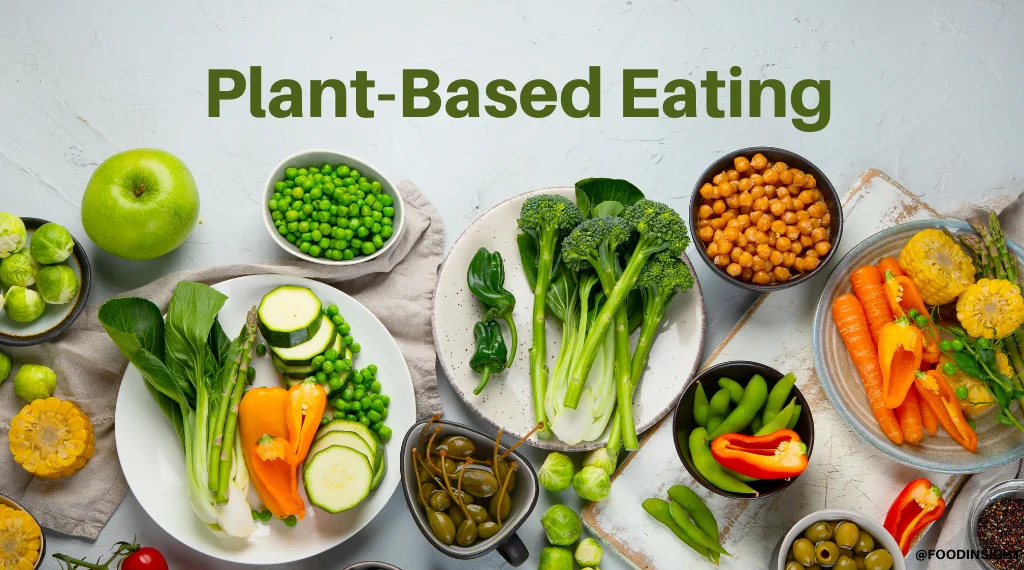Are Sugar Free Sauces Actually Healthy? A Breakdown for Plant-Based Eaters
All Regarding Healthy Food: Advantages of Checking Out Plant Based Options
The conversation bordering plant-based diet regimens has actually acquired significant interest recently. Many individuals are discovering the possible health and wellness benefits, nutritional advantages, and ecological effects connected with these dietary selections. As individuals end up being more aware of their food's impact on well-being and sustainability, inquiries emerge concerning the functionalities of taking on such a lifestyle. What specific changes can one anticipate, and how might these options improve not just personal wellness however additionally the planet's future?
Comprehending Plant-Based Diets
Numerous people associate plant-based diet plans generally with vegetarianism or veganism, these diets can incorporate a broad array of eating patterns that prioritize whole, minimally refined plant foods. Such diet regimens usually include fruits, veggies, entire grains, seeds, legumes, and nuts, while eliminating or restricting animal items. This versatility permits individuals to customize their nutritional choices according to personal preferences and dietary requirements. Some might embrace a primarily plant-based diet plan while still sometimes consuming meat or dairy, frequently referred to as a flexitarian technique. The focus stays on incorporating even more plant foods, which can bring about a diverse array of meals and tastes. Understanding these various analyses of plant-based consuming is necessary for appreciating its access and allure in contemporary food culture.
Health And Wellness Perks of Plant-Based Foods
The wellness benefits of plant-based foods are significant, offering a nutrient thickness benefit that supports overall health. Study suggests that these foods can improve heart health and wellness and play a vital duty in reliable weight monitoring. By incorporating extra plant-based options, people might boost their nutritional choices and advertise lasting health and wellness.
Nutrient Density Advantage
Nutrient thickness plays an essential role in the health and wellness benefits of plant-based foods, making them a compelling selection for those seeking a balanced diet. Plant-based foods, such as fruits, vegetables, beans, nuts, and entire grains, are frequently abundant in essential vitamins, minerals, and anti-oxidants while being lower in calories. This high nutrient density permits individuals to consume less calories while still fulfilling their nutritional needs. Furthermore, these foods are packed with dietary fiber, promoting digestive wellness and assisting in weight monitoring. By including nutrient-dense plant-based alternatives, customers can boost their overall health, sustain their body immune systems, and minimize the risk of chronic diseases. Eventually, the nutrient thickness of plant-based foods underscores their value in a health-conscious way of living.
Heart Wellness Improvement

Weight Administration Assistance
Along with promoting heart wellness, a plant-based diet regimen can substantially aid in weight management. This nutritional strategy emphasizes whole foods such as fruits, veggies, vegetables, nuts, and whole grains, which are normally reduced in calories and higher in fiber contrasted to animal-based products. The high fiber web content assists increase satiety, minimizing overall calorie consumption. Plant-based diet plans are often rich in important nutrients while reduced in harmful fats, making it much easier to maintain a healthy and balanced weight. Research shows that individuals who embrace a plant-based way of living tend to have lower body mass indexes (BMIs) and experience even more successful weight management compared to those who eat meat-heavy diet plans. Accepting plant-based options is a strategic selection for effective weight administration.
Nutritional Value of Plant-Based Components
Plant-based components are rich in necessary nutrients, providing a diverse array of vitamins, minerals, and antioxidants that add to total wellness. A comparison of healthy protein sources reveals that while animal items are usually considered as superior, numerous plant-based options give appropriate healthy protein and various other advantageous substances. Comprehending the dietary value of these components can assist people make educated dietary options.
Important Nutrients in Plants
Nutrient-rich ingredients discovered in plants provide a varied range of essential vitamins and minerals that add considerably to overall wellness. These active ingredients are abundant in vitamins A, C, and K, which support immune function, vision, and blood clotting, specifically. Additionally, plants supply important minerals such as calcium, magnesium, and potassium, essential for heart health, muscle mass function, and bone stamina. The presence of fiber in plant-based foods aids digestion and advertises a healthy gut microbiome. Anti-oxidants, discovered perfectly in vegetables and fruits, help fight oxidative stress and lower inflammation. Moreover, many plant foods are reduced in calories yet high in nutrients, making them a superb selection for those looking for to maintain a healthy and balanced weight while ensuring ideal nutrient consumption.
Comparing Healthy Protein Sources
Protein sources vary considerably in their dietary profiles, with plant-based active ingredients supplying distinct advantages. Unlike pet healthy proteins, which commonly consist of hydrogenated fats and cholesterol, plant healthy proteins often tend to be lower in these undesirable elements. Legumes, nuts, seeds, and whole grains are rich in important amino acids, fiber, vitamins, and minerals. For example, lentils offer high protein web content along with substantial iron and folate, while quinoa is a full healthy protein, using all 9 necessary amino acids. Furthermore, plant-based proteins are often come with by anti-oxidants and phytochemicals that sustain overall wellness. The change to plant-based healthy protein resources not only enhances nutritional intake yet also lines up with lasting dietary techniques, decreasing environmental effect and go to these guys promoting lasting health advantages.
Environmental Influence of Plant-Based Consuming
As understanding of environment change grows, several individuals are discovering lasting dietary choices that can substantially reduce their ecological footprint. Plant-based consuming has become a considerable factor to decreasing greenhouse gas exhausts, which are mostly related to animals manufacturing. The growing of fruits, grains, veggies, and beans usually requires fewer sources, such as water and land, contrasted to animal farming. In addition, plant-based diet plans can lead to lowered deforestation, as less land is needed for grazing livestock or expanding animal feed. By changing towards plant-based choices, consumers can support biodiversity and promote much healthier communities. On the whole, accepting plant-based consuming not just benefits personal health and wellness yet additionally stands for an essential step towards ecological sustainability and preservation initiatives.
Conquering Common Misconceptions
While lots of individuals recognize the advantages of a plant-based diet, numerous misconceptions typically deter them from fully accepting this way of living. A typical idea is that plant-based diets do not have enough protein; nonetheless, many plant sources, such as vegetables, nuts, and tofu, give enough protein. Additionally, some think that this diet plan is expensive, when actually, staples like beans, rice, and seasonal veggies can be fairly budget-friendly. An additional misunderstanding is that plant-based consuming is extremely restrictive, whereas it really supplies a varied selection of tastes and foods. Several stress that a plant-based diet might lead to deficiencies, yet with appropriate preparation, individuals can acquire all needed nutrients, consisting of minerals and vitamins, while taking pleasure in a wide variety of delicious dishes. Vast Tips for Transitioning to a Plant-Based Way of living
Making the shift to a plant-based lifestyle can be an improving experience, though it usually requires some advice to browse the first changes. First, individuals are encouraged to start progressively, including more fruits, veggies, legumes, and whole grains into their dishes while lowering meat and dairy products usage. Meal planning is important; preparing a weekly food selection can help ease the change and protect against final harmful selections. Exploring cooking methods and new recipes can additionally preserve and improve the experience exhilaration regarding plant-based eating. Additionally, joining support teams or areas can give inspiration and share important pointers. Lastly, staying informed concerning nutrition warranties balanced dishes, preventing deficiencies while promoting a healthy and balanced, satisfying plant-based way of life.
Delicious Plant-Based Dish Ideas
Exploring tasty plant-based meal concepts can influence people to accept an extra nourishing diet plan. One preferred choice is a hearty quinoa salad, including cherry tomatoes, cucumber, and a spicy lemon-tahini dressing. One more favorite is a tasty lentil stew, loaded with carrots, celery, and great smelling natural herbs, best for a soothing supper. For morning meal, overnight oats made with almond milk, chia seeds, and covered with fresh berries supply a healthy start to the day. In addition, a vivid vegetable stir-fry with tofu and a range of vivid veggies can be a fast yet satisfying dish. Finally, creamy avocado toast on whole-grain bread, sprayed with seeds and seasonings, offers an easy yet flavorful snack. These meals display the range and splendor of plant-based consuming.

Often Asked Concerns
Can a Plant-Based Diet Plan Supply Sufficient Healthy Protein?
The concern of whether a plant-based diet can give adequate healthy protein is common. Various resources, including legumes, nuts, seeds, and entire grains, can meet healthy protein needs effectively, sustaining a healthy and well balanced diet for people.
Are Plant-Based Diet Regimens Suitable for Kid?
The viability of plant-based diet regimens for kids depends on mindful preparation. Appropriate nutrients must be ensured, consisting of healthy proteins, vitamins, and minerals. With appropriate assistance, such diets can sustain healthy and balanced development and growth in children.
How Do I Eat in restaurants on a Plant-Based Diet regimen?
Eating out on a plant-based diet includes looking for dining establishments with varied food selections, requesting for modifications, and checking out vegan-friendly choices. Planning ahead and communicating dietary choices can improve the dining experience while maintaining dietary choices.
What Are Usual Irritants in Plant-Based Foods?
Typical irritants in plant-based foods include soy, gluten, nuts, and seeds - Plant Based Beef. People following a find more plant-based diet regimen ought to know these allergens and check out tags meticulously to prevent unfavorable responses and assure secure usage
Can Plant-Based Diets Aid With Weight-loss?
Research shows that taking on a plant-based diet plan may assist in weight-loss as a result of its normally lower calorie density and greater fiber material. This mix can boost satiety, aiding individuals handle their caloric consumption properly. Numerous people connect plant-based diet plans generally with vegetarianism or veganism, these diets can include a wide range of eating patterns that focus on entire, minimally processed plant foods. Nutrient thickness plays a crucial function in the health benefits of plant-based foods, making them a compelling option for those looking for a balanced diet regimen. Plant-based diets have been revealed to noticeably boost heart wellness, as they often include elements that sustain cardio function. In addition to advertising heart health and wellness, a plant-based diet regimen can substantially help in weight management. An usual belief is that plant-based diets lack sufficient protein; nonetheless, various plant resources, such as Discover More Here beans, nuts, and tofu, provide adequate protein.